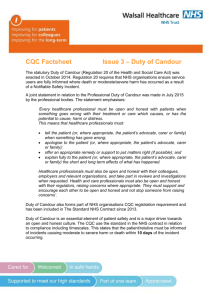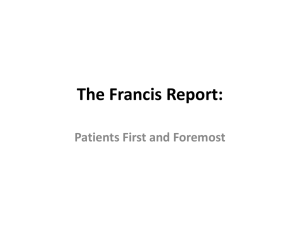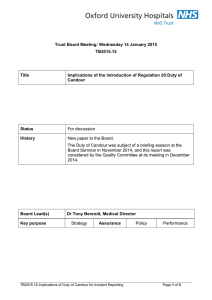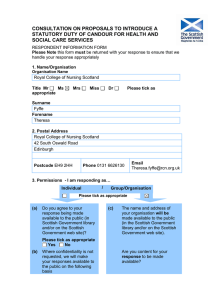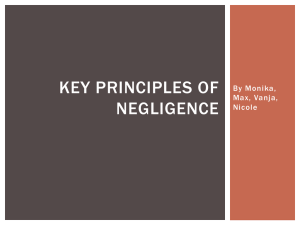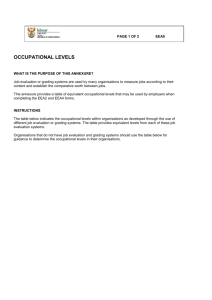Quarrier`s Response to the Duty of Candour Consultation
advertisement
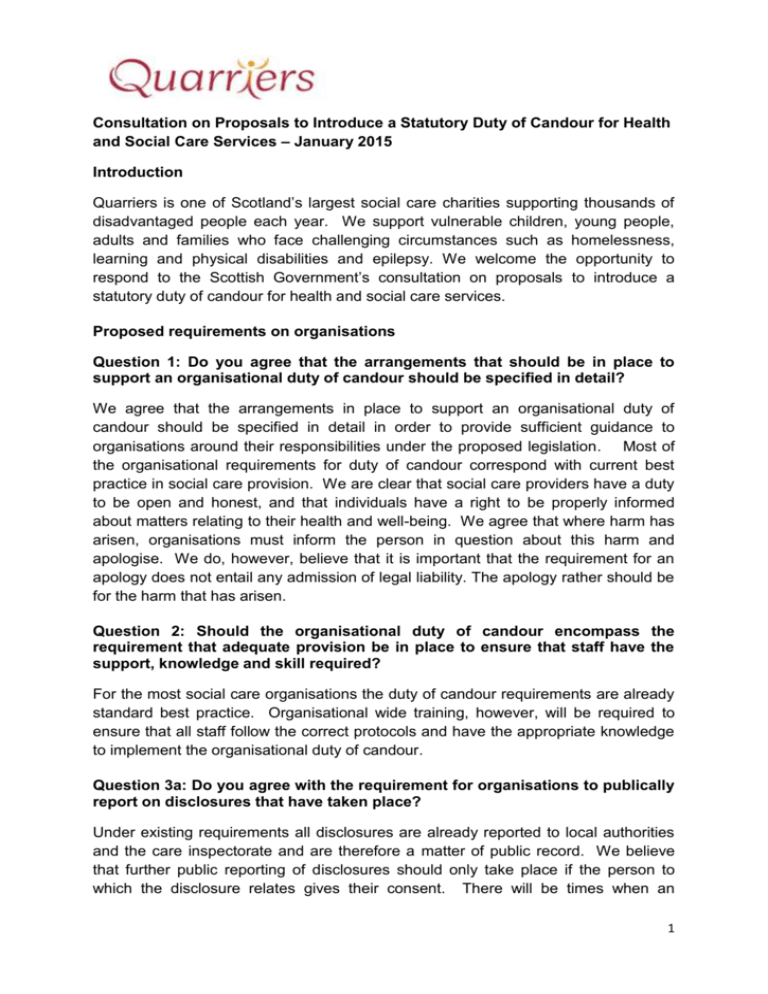
Consultation on Proposals to Introduce a Statutory Duty of Candour for Health and Social Care Services – January 2015 Introduction Quarriers is one of Scotland’s largest social care charities supporting thousands of disadvantaged people each year. We support vulnerable children, young people, adults and families who face challenging circumstances such as homelessness, learning and physical disabilities and epilepsy. We welcome the opportunity to respond to the Scottish Government’s consultation on proposals to introduce a statutory duty of candour for health and social care services. Proposed requirements on organisations Question 1: Do you agree that the arrangements that should be in place to support an organisational duty of candour should be specified in detail? We agree that the arrangements in place to support an organisational duty of candour should be specified in detail in order to provide sufficient guidance to organisations around their responsibilities under the proposed legislation. Most of the organisational requirements for duty of candour correspond with current best practice in social care provision. We are clear that social care providers have a duty to be open and honest, and that individuals have a right to be properly informed about matters relating to their health and well-being. We agree that where harm has arisen, organisations must inform the person in question about this harm and apologise. We do, however, believe that it is important that the requirement for an apology does not entail any admission of legal liability. The apology rather should be for the harm that has arisen. Question 2: Should the organisational duty of candour encompass the requirement that adequate provision be in place to ensure that staff have the support, knowledge and skill required? For the most social care organisations the duty of candour requirements are already standard best practice. Organisational wide training, however, will be required to ensure that all staff follow the correct protocols and have the appropriate knowledge to implement the organisational duty of candour. Question 3a: Do you agree with the requirement for organisations to publically report on disclosures that have taken place? Under existing requirements all disclosures are already reported to local authorities and the care inspectorate and are therefore a matter of public record. We believe that further public reporting of disclosures should only take place if the person to which the disclosure relates gives their consent. There will be times when an 1 individual’s lack of verbal communication or capacity will make this consent difficult to obtain. Question 3b: Do you agree with the proposed requirements to ensure that people harmed are informed? Individuals have the right to be properly informed about matters relating to their health and well-being and it is essential that social care providers are open and honest. Organisations have a moral duty to inform people in their care about the nature and extent of any harm caused to them. Question 3c: Do you agree with the proposed requirements to ensure that people are appropriately supported? We recognise the importance of ensuring people are supported appropriately to access emotional and practical support. The consultation document states there ‘must be an offer of reasonable support provided to the person harmed, relatives and staff who have been involved with the event’. For the sake of clarity and given the resources implications for organisations here, we feel that the parameters of the above requirement need to be more clearly defined. Question 4: What do you think is an appropriate frequency for reporting? Procedures are already in place in to report on harm in social care services, to avoid duplication we recommend that as far as possible reporting procedures should be aligned with existing practice. Question 5: What staffing and resources that would be required to support effective arrangements for the disclosure of instances of harm? As already mentioned, while most of the organisational requirements for the duty of candour proposals are already standard best practice, training will be required to ensure that all staff follow the correct protocols implement the organisational duty of candour correctly. This will inevitably have resource implication on a social care sector whose finances are already stretched. The requirement for there to be an ‘offer of reasonable support provided to the person harmed, relatives and staff who have been involved with the event’ also has considerable resource implications for organisations. At present, however, the exact parameters of the above requirement are not defined and therefore the potential resource implications for organisations remain unclear. Disclosable events Question 6a: Do you agree with the disclosable events that are proposed? 2 We broadly agree with the disclosable events contained within the consultation document. The parameters, however, of what constitutes ‘injury or prolonged physical or psychological harm’ needs to be more clearly defined. We very much favour a nationally agreed definition of the types of harm that would trigger the duty and commend wide consultation around this in order to achieve broad consensus. Question 6b: Will the disclosable events that are proposed be clearly applicable and identifiable in all care settings? There are likely to be circumstances where ambiguity exists around what exactly constitutes prolonged physical or psychological harm for example. Not every incident will be clear cut and organisation may have to make a judgement call to determine which events are disclosable. Question 6c: What definition should be used for ‘disclosable events’ in the context of children’s social care? We believe that the definition used for ‘disclosable events’ in the context of children’s social care should focus on individual harm as a result of corporate culpability rather than on long term unintended consequences resulting from decisions taken in good faith. Question 7: What issues need to be addressed to support effective mechanisms to determine if an instance of disclosable harm has occurred? To support effective mechanisms to determine if an instance of disclosable harm has occurred, it is vital that there are clear and accessible internal policies and procedures in place. These should be aligned with existing standards and processes from a regulatory and governance perspective. It is essential that HSE and OSCAR and Care Inspectorate work together to ensure that there is linked up approach and to avoid any duplication. Monitoring of the statutory duty of candour Question 8: How you think the organisational duty of candour should be monitored? We think that monitoring of the organisational duty of candour should be attached and aligned with existing standards and processes already established by the Care Inspectorate. Question 9: What should the consequences be when it is discovered that a disclosable event has not been disclosed to the relevant person? 3 Existing actions and penalties available to the Care Inspectorate and Local Authorities such as a downgrading or a Service Concern and Service Review should apply. It is essential, however, that penalties do not create a culture where people are scared to report disclosable events. The purpose of a duty of candour should be to encourage honesty and integrity within the health and social care system to allow organisations to learn from and act on mistakes. It should not be used as a means to be excessively punitive when errors occur. Lorne Berkley Policy Manager Lorne.Berkley@quarriers.org.uk Phone: 01505 616047 4
